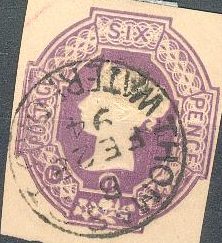 |
|||||
|
|||||
| Preview of Stamps Catalogue: VOLUME 1 |
 |
|||||
|
|||||
| Preview of Stamps Catalogue: VOLUME 1 |
Return To Catalogue - Great Britain, Queen Victoria, Large sizes, forgeries - Great Britain Overview
Note: on my website many of the
pictures can not be seen! They are of course present in the catalogue;
contact me if you want to purchase it.
Six Pence violet
(don't confuse this stamp with a telegraph form of 1885,
small circles with numbers are added in the design)
Ten Pence brown
(this stamp in blue is a telegraph form.)
One Shilling green
(this stamp with small numbers added is a telegraph form.)

(Stamp with parts of neighbouring stamps, reduced size)
These stamps were printed one by one by hand, and therefore the distance between the stamps is very irregular. The images of two stamps can even touch each other, as in this example. These stamps have plate numbers, but are difficult to distinguish (at the bottom part of the head).
Value of the stamps |
|||
vc = very common c = common * = not so common ** = uncommon |
*** = very uncommon R = rare RR = very rare RRR = extremely rare |
||
| Value | Unused | Used | Remarks |
| 6 p | RRR | RR | |
| 10 p | RRR | RRR | |
| 1 Sh | RRR | RR | |
| Stamps cut to shape | ? | *** | |
Telegraph forms in the same design:


(Reduced sizes)
The above images show the telegraph form in the same design as the 1 Sh stamp. Note that there are 3 circles added to the design.

(Telegraph form with numbers added in the design)

(6 p with small circles added with 5 dots in the center, where
the numbers are in the previous telegraph cut, also a cut from a
telegraph form?)
2 Shillings 6 Pence lilac 5 Shillings red, white letters in the corners 5 Shillings red, coloured letters 10 Shillings blue 10 Shillings green (other design) 1 Pound brown

With typical telegraph box cancel.
1 Pound brown (lying format) 1 Pound green
5 Pounds orange
All these stamps are perforated 14.
Value of the stamps |
|||
vc = very common c = common * = not so common ** = uncommon |
*** = very uncommon R = rare RR = very rare RRR = extremely rare |
||
| Value | Unused | Used | Remarks |
| 2 Sh 6 p | RR | *** | Watermark 'Anchor' |
| 5 Sh | RRR | RR | white letters in the corners, watermark 'Cross' or 'Anchor' |
| 5 Sh | RR | *** | coloured letters in the corners, watermark 'Anchor' |
| 10 Sh green | RRR | RRR | watermark 'Cross' or 'Anchor' |
| 10 Sh blue | RR | R | Watermark 'Anchor' |
| 1 Pound brown | RRR | RRR | Smallest stamp, watermark 'Cross' or 'Anchor' |
| 1 Pound brown | RRR | RRR | Largest stamp, watermark 'Crowns' or 'Globe with
cross' With 'Specimen' overprint: RR |
| 1 Pound green | RR | RR | Watermark 'Crowns' With 'Specimen' overprint: R |
| 5 Pounds | RRR | RRR | 1882; Watermark 'Anchor'; The 5 Pounds was made from
a Telegraph stamp, by removing "TELEGRAPHS" and replacing it by "POSTAGE". It was mainly used to pay excise duty on alcoholic drinks, rarely for postage. |

(Watermark 'Anchor' on the 5 Sh stamp, reduced size)

5 Pound stamp with "MANCHESTER ACCOUNTS" cancel
(reduced size)

10 Sh with "PARLIAMENT HOUSE No 12" cancel, send as an
'example' to Cape of Good Hope together with some uncancelled
stamps. This higher value stamp was cancelled.
The 5 Pounds stamp was printed in 14 rows of 4 stamps each with the following corner letters (the same as for the corresponding Telegraph 5 Pounds stamp, but the sheet was divided in two parts):
| A A | B A | C A | D A |
| A B | B B | C B | D B |
| A C | B C | C C | D C |
| A D | B D | C D | D D |
| A E | B E | C E | D E |
| A F | B F | C F | D F |
| A G | B G | C G | D G |
| A H | B H | C H | D H |
| A I | B I | C I | D I |
| A J | B J | C J | D J |
| A K | B K | C K | D K |
| A L | B L | C L | D L |
| A M | B M | C M | D M |
| A N | B N | C N | D N |